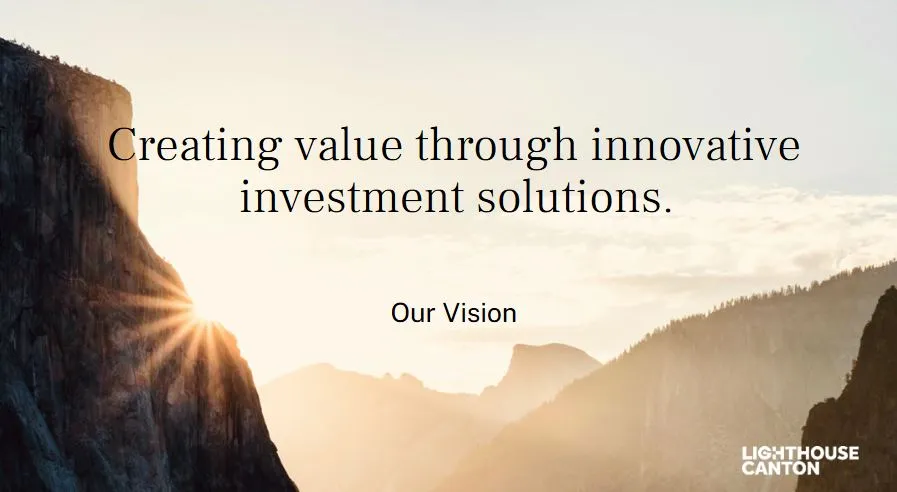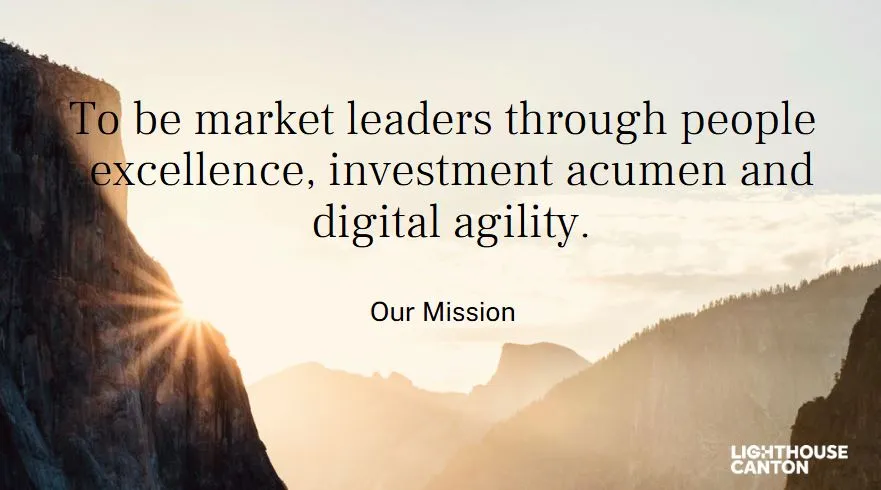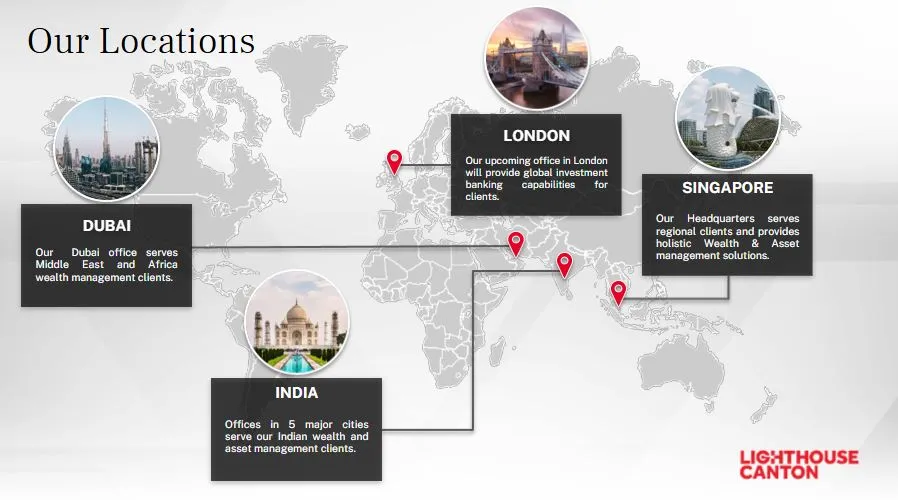For any young company, the first decade is often the toughest. Many do not survive, and even fewer thrive. As Lighthouse Canton crosses the 10-year milestone, it marks not just longevity but a firm establishment of its business model, values, and vision.
Shilpi Chowdhary, Group CEO, spoke to Lighthouse Canton IDEAs: Views & Insights on the journey so far and the path ahead in an open and interactive discussion.
A DECADE OF RESILIENCE AND GROWTH
For Chowdhary, crossing the 10-year mark is not just about survival—it’s about proving that the company’s foundation is strong enough to sustain and grow. He emphasises that many companies fail within their first decade, with failure rates as high as 94-95%.
“If you survive the first 10 years and thrive in them, it’s an acknowledgment that your value systems, business model, and vision are falling into place. That gives us a lot more encouragement to continue doubling down on that vision even more.”
He likens this journey to running a marathon:
“In a marathon every landmark tells you how far you’ve come—and how much further you can go. You’ve covered some distance, but you also know there’s more to go. That’s what this milestone means for us—it’s an acknowledgment of how far we’ve come and a push toward where we want to go next.”
As Steve Jobs once said, “I'm convinced that about half of what separates the successful entrepreneurs from the non-successful ones is pure perseverance.”
Lighthouse Canton’s journey embodies this ethos—pushing forward in the last 10 years.


BUILDING AN INSTITUTIONAL POWERHOUSE
Since its inception, Singapore headquartered Lighthouse Canton has made bold moves—expanding into Dubai, India and the UK, developing its asset management business, and embracing technology. But one of the most critical decisions came in 2022.
Chowdhary recalled: “We sat down as a leadership team to decide—do we stay boutique or scale up into a force to reckon with? Both paths were very different, and we had to take a call one way or the other. It wasn’t just my decision; I needed to see where the team was leaning. That moment of clarity led us to choose a path of scale and quality, and that decision rejuvenated the entire firm.”
This decision set the stage for a larger and more ambitious roadmap, ensuring that the company was not just another boutique outfit but a formidable presence in the financial industry.
Lighthouse Canton’s ambition has been set to go beyond traditional asset and wealth management. The company set out to build an institution.
Chowdhary explained the definition of an institution for Lighthouse Canton.
“For us this institution comprises multiple verticals—a comprehensive wealth management offering, an asset management arm, M&A and investment banking capabilities. Then we have the layer that integrates all of these: our digital capability.”
Technology plays a critical role in this vision.
“Better user experience, sharper client insights, improved efficiency, and higher productivity—this is what we are focused on. We’re looking at reimagining private banking through a high-touch, technology-driven model. Our digital innovation is at the heart of delivering value to our clients.”
As Warren Buffett once emphasised, the importance of long-term vision: “Someone’s sitting in the shade today because someone planted a tree a long time ago.” Lighthouse Canton’s approach to institution-building reflects this philosophy.
A TEAM THAT STAYS THE COURSE
For Chowdhary, success is not just about strategy but about people. He is quick to emphasise the role of his team in making Lighthouse Canton what it is today.
“I’m just one cog in the wheel. What I’m most proud of is that our core team has stuck together through all our ideas. There’s a common purpose, a common language, and a shared vision. We started with three people, and those three are still here. Over time, we’ve built a leadership team that takes ownership and drives initiatives.”
Alignment of purpose, he noted, is critical.
“Many businesses fail when founding teams lose their shared vision. For us, transparency, accountability, and mutual respect have kept us strong. A lot of value destruction happens when people start pulling in different directions or when core values become misaligned. That has never happened here.”
Charlene Lin, Managing Director, Strategic Growth - North Asia and Southeast Asia added, "Looking back over these ten years, what stands out most is how we've grown together as a team while maintaining the same core principles we established on day one. Building deep client relationships has always been our foundation, even when it meant making difficult choices that weren't always the most profitable in the short term. That integrity and long-term vision has ultimately been our greatest strength."
This cohesive culture has proven vital as the company expands beyond its initial footprint. Prashant Tandon, MD & CEO for UAE, described the delicate balance of regional adaptation and organisational consistency.
"Establishing our presence in the Middle East and North Africa meant navigating a unique regulatory landscape while respecting local business customs. We faced moments when the easier path would have been to compromise on our standards, but we chose the harder road of maintaining our integrity. Building our team here required patience—finding professionals who not only had the right expertise but also shared our collaborative mindset and client-first approach. This region has its own rhythm of doing business, and our success came from honouring that while staying true to Lighthouse Canton's foundation."
In India, a similar journey unfolded under different circumstances.
Sumegh Bhatia, MD & CEO for India, reflected on the challenges of establishing the firm's presence in a competitive market.
"When we first set up in India, we faced the daunting challenge that has defeated countless foreign BFSI firms in this unique market. Success required more than transplanting our model—it demanded a fundamental localization approach. We recalibrated for different market dynamics, adapted our talent strategy to local motivations, and built credibility from scratch in a relationship-driven ecosystem. Our breakthrough came from empowering the local team to reimagine solutions while upholding our core principles. Today, seeing our India team thriving with its own distinct identity yet completely aligned with our global vision is immensely rewarding."
Also read: Talent diversity becomes key to Asia’s wealth future
Lighthouse Canton began its journey as a wealth manager, but Sanket Sinha, Managing Director and Global Head of Asset Management at Lighthouse Canton noted that a critical pivot was made early in its evolution, when early in its journey it decided to build in-house an asset management offering too.
“When you rely solely on distributing third-party products, your ability to create real value is limited," said Sinha. "Developing our own asset management capabilities gave us the freedom to design strategies from the ground up—tailored, differentiated, and conviction-led. It’s been a natural extension of our entrepreneurial mindset, allowing us to move from being passive participants to active shapers of investment outcomes. That shift has made all the difference when engaging with long-term allocators."
DEFINING MOMENTS
While milestones define progress, Chowdhary believes challenges shape character.
He pointed to a particularly tough period in the firm’s asset management business:
“Our handling of the asset management business, especially on the private equity side, was one of those defining moments. There was significant pressure on us, and it could have destroyed our morale. But we stood firm. We did not get caught up in market frenzy or allow ourselves to be bullied by external forces. That was the moment I knew—this team has what it takes.”
Chowdhary reflected on that time as a turning point.
“When things get tough, you really see the character of a company and its people. There were moments that could have destroyed value, but we navigated through them. It reinforced my belief that this team is built to last.”
Audrey Tang, Chief Operations Officer echoes this sentiment, adding that this resilience came from building strong operational foundations.
"The strength of any organization is truly tested during its darkest hours. We faced numerous operational challenges in our early years that weren't visible externally but required immense dedication to overcome. We had to build robust systems from scratch with limited resources, often working around the clock. What kept us going wasn't just ambition but the shared belief that we were creating something meaningful and enduring. That operational resilience we developed then continues to be our backbone today."
NEXT DECADE WITH A 10x MINDSET
Chowdhary is clear, the next decade will be very different.
“What got us here will not take us forward. We must unlearn and relearn. That means being more process-oriented, more tech-driven, and ensuring productivity gains are tangible. Instead of simply adding people as we grow, we need to rethink how we operate.”
But the biggest shift is mindset.
“The effort for 2x and 10x growth is the same—it’s the thinking that changes. A 10x mindset is about continuous improvement. Like investing, compounding daily efforts leads to exponential results over time.”
He emphasises that organisations, like living organisms, must evolve to stay relevant.
“If we want to thrive, we must stay disciplined, keep improving our knowledge and skills, and keep adapting. Companies must do the same.”
Markets are in a constant state of evolution, and Lighthouse Canton’s approach is to anticipate rather than react.
Chowdhary explained “Markets behave differently at different times. A few years ago, China was the most promising, today it’s India, and tomorrow it could be somewhere else. Being present in multiple jurisdictions allows us to stay ahead of these shifts.”

He added, “Clients choose us because they see a maze of complexity in investments, and they trust us to simplify it. They also trust that we will always do the right thing—we are not here to maximize profits at their expense.”
The firm remains focused on innovation and uncovering new investment opportunities.
“Most people don’t have access to areas like early-stage AI or niche sectors like China’s robotics industry. We actively look for these openings and bring them to our clients.”
For Chowdhary, the next phase of growth is about staying ahead: “It’s about anticipating and then making those changes. If we keep learning and evolving, we will continue to thrive.”














%20(29).jpg)
%20(27).jpg)
.jpg)
.png)